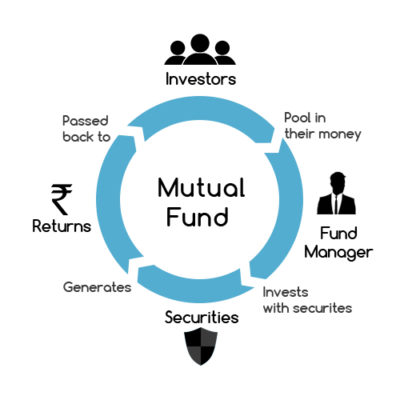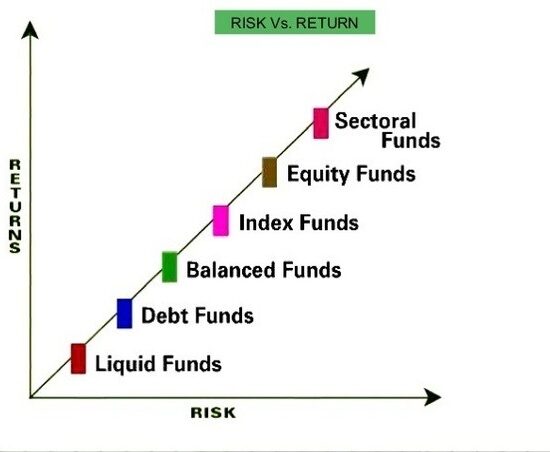What is Mutual Funds ?
Mutual Fund is a trust that collects money from a number of investors who share a common investment objective. Then, it invests the money in equities, bonds, money market instruments and/or other securities. This fund is managed by a professional fund manager. Each investor owns units, which represent a portion of the holdings of the fund. The income/gains generated from this collective investment is distributed proportionately amongst the investors after deducting certain expenses, by calculating a scheme’s “Net Asset Value or NAV. Simply put, a Mutual Fund is one of the most viable investment options for the common man as it offers an opportunity to invest in a diversified, professionally managed basket of securities at a relatively low cost.

Open-ended Fund
An open-ended fund is a fund that is available for subscription and can be redeemed on a continuous basis. It is available for subscription throughout the year and investors can buy and sell units at NAV related prices. These funds do not have a fixed maturity date. The key feature of an open-ended fund is liquidity.
Close-ended Fund
A close-ended fund is a fund that has a defined maturity period, e.g. 3-6 years. These funds are open for subscription for a specified period at the time of initial launch. These funds are listed on a recognized stock exchange.
Interval Funds
Interval funds combine the features of open-ended and close-ended funds. These funds may trade on stock exchanges and are open for sale or redemption at predetermined intervals on the prevailing NAV.
Equity/Growth Funds
Equity/Growth funds invest a major part of its corpus in stocks and the investment objective of these funds is long-term capital growth. When you buy shares of an equity mutual fund, you effectively become a part owner of each of the securities in your fund’s portfolio. Equity funds invest minimum 65% of its corpus in equity and equity related securities. These funds may invest in a wide range of industries or focus on one or more industry sectors. These types of funds are suitable for investors with a long-term outlook and higher risk appetite.
Debt/Income Funds
Debt/ Income funds generally invest in securities such as bonds, corporate debentures, government securities (gilts) and money market instruments. These funds invest minimum 65% of its corpus in fixed income securities. By investing in debt instruments, these funds provide low risk and stable income to investors with preservation of capital. These funds tend to be less volatile than equity funds and produce regular income. These funds are suitable for investors whose main objective is safety of capital with moderate growth.

Balanced Funds
Balanced funds invest in both equities and fixed income instruments in line with the pre-determined investment objective of the scheme. These funds provide both stability of returns and capital appreciation to investors. These funds with equal allocation to equities and fixed income securities are ideal for investors looking for a combination of income and moderate growth. They generally have an investment pattern of investing around 60% in Equity and 40% in Debt instruments.
Money Market/ Liquid Funds
Money market/ Liquid funds invest in safer short-term instruments such as Treasury Bills, Certificates of Deposit and Commercial Paper for a period of less than 91 days. The aim of Money Market /Liquid Funds is to provide easy liquidity, preservation of capital and moderate income. These funds are ideal for corporate and individual investors looking for moderate returns on their surplus funds.
Gilt Funds
Gilt funds invest exclusively in government securities. Although these funds carry no credit risk, they are associated with interest rate risk. These funds are safer as they invest in government securities.
Tax-Saving (Equity linked Savings Schemes) Funds
Tax-saving schemes offer tax rebates to investors under specific provisions of the Income Tax Act, 1961. These are growth-oriented schemes and invest primarily in equities. Like an equity scheme, they largely suit investors having a higher risk appetite and aim to generate capital appreciation over medium to long term.
Index Funds
Index schemes replicate the performance of a particular index such as the BSE Sensex or the S&P CNX Nifty. The portfolio of these schemes consist of only those stocks that represent the index and the weightage assigned to each stock is aligned to the stock’s weightage in the index. Hence, the returns from these funds are more or less similar to those generated by the Index.
Sector-specific Funds
Sector-specific funds invest in the securities of only those sectors or industries as specified in the Scheme Information Document. The returns in these funds are dependent on the performance of the respective sector/industries for example FMCG, Pharma, IT, etc. The funds enable investors to diversify holdings among many companies within an industry. Sector funds are riskier as their performance is dependent on particular sectors although this also results in higher returns generated by these funds.
